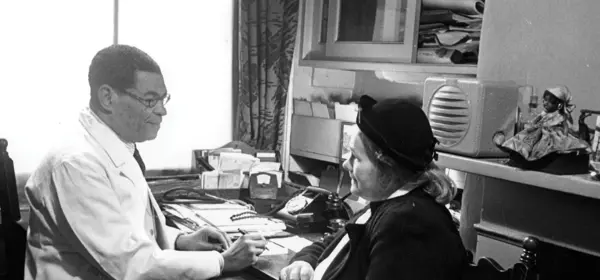Goodbye juniors, hello resident doctors
Goodbye juniors, hello resident doctors
Today marks the day younger doctors in the NHS are given the nomenclature they deserve
Labels and titles in medicine hold significant weight as they can profoundly influence perceptions and attitudes.
In a historic shift for the medical profession, the campaign to end the term ‘junior doctor’ has finally come to fruition, with the new term resident doctor taking effect from today.
This is a special moment for doctors across the UK, symbolising a fresh start in our interactions with stakeholders.
With this change, we as doctors can now approach our professional relationships from a position of appropriate recognition.
We can at last move on from an era in which our title served to undermine us both individually, and as a highly skilled workforce which demonstrates its skills, competence and dedication every day.
It is also a special moment for me personally to see how far we have come on this journey. A year ago, at the 2023 BMA annual representative meeting, I had the opportunity to present and advocate for the motion to end the use of the term junior doctor.
As the results flashed across the screen following the debate, and I saw that the motion had been carried, I remember the profound sense of humility I felt at witnessing the overwhelming support from the profession as a whole.
The term junior doctor has always seemed perplexing to me. Indeed, our responsibilities are anything but junior but in fact crucial to the healthcare system and to patient care.
Every day these so-called junior doctors act as the first point of contact on the ward for sick and unwell patients. They are in theatre operating on our loved ones and their roles extend to leading teams across various specialties.
Beyond negatively impacting morale, the term ‘junior’ can foster unconscious bias among patients and other healthcare staff, leading them to overlook the skills and qualifications that these professionals possess.
This change in terminology therefore is not merely a fleeting trend, but rather a powerful tide that has been gathering momentum for years.
Starting as a grassroots movement almost a decade ago, it has garnered widespread support from some of the UK’s most influential institutions with the Royal Society of Medicine, Royal College of Surgeons of Edinburgh and others publishing strong statements of support over the years. (2)
Two years ago, Professor Scarlett McNally produced an independent report for Health Education England, which was among the first comprehensive reviews addressing this issue (3), and helped to pave the way for recent progress.
Once the decision was made to discontinue the term 'junior', finding a suitable alternative appeared to be equally challenging.
The title of resident was ultimately chosen as a result of the collective efforts of the BMA junior doctors committee, and, I can wholeheartedly say, it has been a pleasure to serve alongside such dedicated individuals in the past year.
It is safe to say doctors are undergoing a significant shift in their self-perception. The recent demands for pay restoration and improved working conditions are examples of this in action, and it would not be unreasonable to anticipate this momentum extending to the language we use to describe our roles.
I hope this change will foster a deeper sense of inclusion in the profession. The 2024 GMC workforce report highlighted the rich diversity in our NHS, not only in terms of ethnicity but also how roles have evolved past the binary terms of ‘junior’ and ‘senior’ and instead include a wide variety of expertise represented by staff, associate specialist and and locally employed doctors.
As the workforce continues to change, it is essential our terminology evolves as well. The language and labels we use should reflect the multicultural and diverse nature of the NHS and this momentous change is symbolic of a bold step forwards in creating a more inclusive and respectful environment for all doctors, promising to reshape the healthcare landscape for the better.
Sai Pillarisetti is a resident doctor based in Manchester and is the chair of the British International Doctors Association post-graduate doctors forum
(1) McNally S What should we call junior doctors? Updated July 2023
(2) Pillarisetti SR, Kanneganti C, Majeed A, Asanati K. Rethinking the terminology: transitioning from “junior doctors” to “postgraduate doctors” for enhanced representation in modern medical practice. BJGP Open 2023;7:BJGPO.2023.0178. doi: 10.3399/BJGPO.2023.0178
(3) General Medical Council. (2024). The State of Medical Education and Practice in the UK: Some perspectives on the workplace
- Until September 2024, resident doctors were referred to as ‘junior doctors’ by the BMA. Articles written prior to this date reflect the terminology then in use



